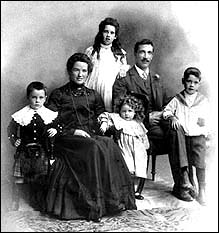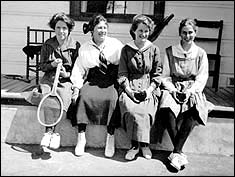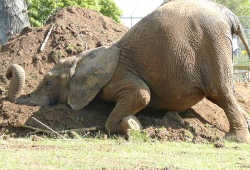Lance Mc Caskill – 17/3/00
A firsthand account of growing up in South Canterbury early in the twentieth century left by well-known naturalist, the late Lance McCaskill
Lancelot William McCaskill was born in Winchester, South Canterbury, on 8 May, 1900. His parents, Daniel McCaskill and Janet (nee Bisset) were both born in New Zealand to parents who had emigrated from Scotland. Lance was third in a family of four. He wrote a short memoir of his first forty five years about 1980 and this section records his childhood and teenage years. He married Isobel Aitken in 1925 and they had two sons and a daughter. He led a very active life as teacher, lecturer, conservationist and writer. He retired from Lincoln College in 1965 and died in 1985.
Margery Blackman, Lance McCaskill’s daughter, has supplied the above information, Lance’s story and the photographs.
Lance’s story As a child I lived in Winchester in South Canterbury. My grandfather,
|
|
| The McCaskill family 1904 or 1905 From left to right Lance, Janet, Nella, Isabel, Daniel, Gordon |
Peter McCaskill, started the Epworth woolscour at Temuka in 1873 and later another at Silverstream near Fairlie. My father, Daniel McCaskill, was manager of the Winchester scour on Waihi Creek.
For Sunday best I wore my kilt. Two memories I have of my father are associated with it. My father was President of the Temuka Caledonian Society which ran Boxing Day Athletic Sports. A star item was the parade of the pipe band round the ring with my father and me marching with the Drum-major in the lead. I was four and a half.
The second was before he went to England in early 1905 to study the wool in the factories at Leeds and Bradford. All the family went to Timaru by train and were photographed in a place in the Arcade. I wore my kilt.
The only other time I remember him was when he was so ill. I had been at a relative’s farm and was driven over to see him. I can remember being held up for him to kiss me. I understand he died next day, aged thirty five, of meningitis.
Primary School Years Mother leased the fifty odd acres with the Wool Scour but we had the grazing for the cows, always one, sometimes two. They were grazed for the day across the Waihi Creek, this often involving up to an hour’s walk home for milking at night.
Often a bit of fly fishing was done while collecting the cows, usually
|
|
| Legal fishing while at high school |
legal! In all my time at Winchester I never came home empty handed. We only tickled the fish if they were not taking the fly. On one occasion on a very hot day in the summer holidays three of us went fishing and failed to get a bite. We got into the water and under the watercress in a few minutes we had three or four fish each. To make them appear legal we were busy hooking the mouths of the fish with flies when out from the gorse burst the Temuka Acclimatisation Society Ranger! He gave us a good talking to and confiscated all the fish. We never liked him afterwards.
Bounty for eggs One of the joys of the life we led was bird watching and bird nesting. Eggs were bought for threepence a dozen by the Temuka Roads Board (heads for 1/- a dozen) for sparrows, thrushes and blackbirds. The sheds at the woolscour were a haven for sparrow nests and easy to climb to. We learned to leave one egg and this could be done for up to ten days. Then we would let them lay four to five and take the lot. We would cycle to Temuka on Saturday mornings, lay the eggs out on the grass and later collect payment, most of which we kept for special savings.
Apart from the egg collecting we enjoyed watching the small birds. We knew them all and their eggs and nests and were careful to leave undisturbed any not rated as pests.
Trees and gardens We were helped in this by our headmaster, J. P. Kalaugher, a great naturalist and special lover of native trees. He took the school to Geraldine Bush once a year in drays and waggons. There we were introduced to matai and totara and other natives, and also to birds – tomtits, warblers and fantails.
He was a keen gardener and on two or three occasions Winchester School won a shield for the best school garden in South Canterbury. On one occasion it was inspected by Sir Joseph Ward, then Prime Minister.
My other garden experience was at home. Mother was a very keen gardener and under her supervision we grew all our own vegetables and looked after the flower garden and shrubbery. After we went to school in Timaru we often biked home for the weekend so that we could do the garden. The sixteen mile ride was not always easy – no tar seal and often a nor’wester or sou’wester.
Pets Up until about 1910 we had a donkey. He usually lived in the corner paddock opposite the hotel and was the friend of all the kids going to school. He ate holes in the macrocarpa hedge so that the kids could supply him with sweets and apples.
Our other favourite pet was Maggie, a very fine male white-backed magpie reared after falling out of a nest. The first tune (and the last) he learned was “There is nae luck about the house, there is nae luck at all”, which he whistled from dawn to dusk. He was a real wizard about grass-grubs on the lawns.
Outings Sunday excursions were by courtesy of Jack McInnes, my mother’s manager of the wool scour. He leased it from Mother, but lived in a ‘galley’ and had his meals with our family. He had a wagonette and pair of horses and took the family on all-day picnics – as far as Woodbury, Geraldine Bush, Hilton, and the mouths of the Temuka and Orari Rivers. He taught us to boil billies, harness horses, build harbours in streams, swim – in fact he did what a father would have done. In 1918 Mother sold the wool scour and shifted to Timaru just after I started at Lincoln College.
The annual inspection The great day of the school year was the annual inspection. Everything was polished up and everybody was in their Sunday best. Our inspectors were Alec Bell (afterwards Director of Education) and Mr Gow. The latter had a fearsome moustache and an equally fearsome frown. Just looking at kids he would frighten them into silence even though they knew the answers. I remember on one occasion he said the first two lines of Gray’s elegy:
“The curfew tolls the knell of parting day The lowing herd winds slowly o’er the lea.”
Then pointing at a boy he shouted, “Who wrote this?” The boy struggled to his feet, shook all over and stammered, “Please sir, I didn’t.”
I managed to win a South Canterbury Education Board Scholarship in 1912.
Sport J. P. Kalaugher was a very keen sportsman and taught us rugby and cricket.
|
|
| Timaru Girls’ High School girls visiting for a tennis party. Isobel Aitken, later to become Lance’s wife, is third from the left. |
Dan Ferguson (headmaster after Kalaugher 1911-12) encouraged sport, but did not participate. However he arranged a cricket match in 1912 with Waihi School. Roger Blunt was captain. I remember fielding at point and catching Roger out and then making two runs.
At our home in Winchester we had a croquet lawn and tennis court – grass and later asphalt. Mother always encouraged us to play both games and invite friends. We played tennis especially when at High School, bringing parties out for weekends. These mixed parties were great social occasions and resulted eventually in my marriage.







